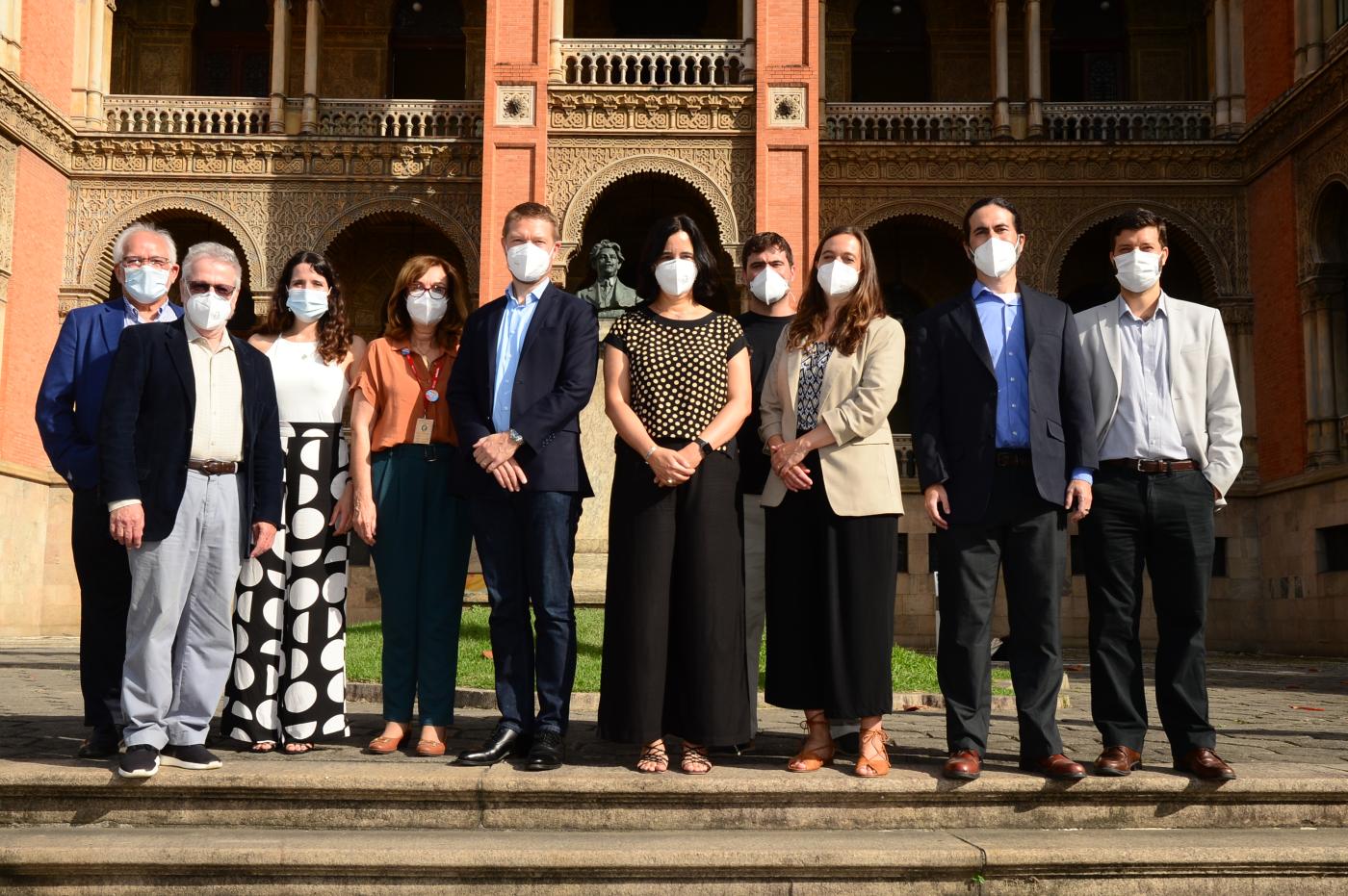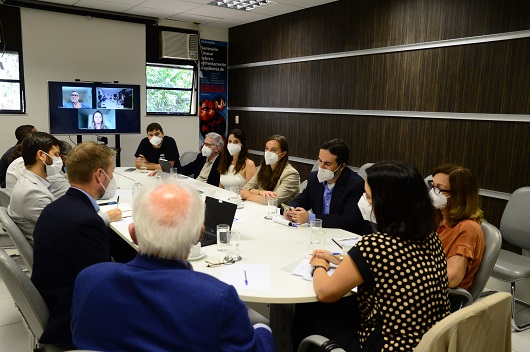WHO and Fiocruz discuss acting on epidemiologic intelligence hub
03/08/2022
Fiocruz News Agency
A partnership with the World Health Organization that started being drawn in March this year went a step further last Friday (07/29). If four months ago the assistant director general of the WHO’s Division of Intelligence and Surveillance Systems for Emergencies in Health, Chikwe Ihekweazu, brought the proposal that Fiocruz would participate in the Hub for Pandemic and Epidemic Intelligence that the WHO is assembling in Berlin, this time the director of the Health Emergency Information and Risk Assessment Department, Oliver Morgan, was at the Foundation to discuss how such joint action would take place. The idea is that the Foundation may share its experience and serve as a connection with other countries in the region and Portuguese-speaking countries in Africa.
Oliver Morgan visited Fiocruz to discuss the Foundation's participation at the WHO Hub in Berlin (photo: Peter Ilicciev)
Accompanied by Julie Fontaine, epidemiology coordinator, and Raquel Medialdea, training coordinator, both from the Epidemic Intelligence from Open Sources (EIOS), Morgan talked to members of the Foundation about the fields and ways in which this partnership could be built. EIOS is an initiative led by WHO that gathers several sectors, and by which the Hub intends to offer integrated solutions as well as a unified approach towards health hazards under the One Health perspective.
“With the COVID-19 pandemic, we learned that all countries face similar challenges when it comes to public health surveillance. Fiocruz has a lot of expertise in this area. I believe that working as a partner to the Hub will be a great opportunity for the Foundation to share this experience with countries both in this region as well as elsewhere in the world”, Morgan said.
Possible areas for acting
Oliver Morgan is the head of the Hub, which responds to the Surveillance Division led by Chikwe Ihekweazu. When visiting Fiocruz, Morgan got to know the Moorish Castle, the Museum of Life, and the Laboratory for Respiratory Viruses and Measles of the Oswaldo Cruz Institute (IOC). But the partnership started being discussed in the meeting room of the Fiocruz Global Health Center (CRIS/Fiocruz).
The Hub seeks to build partnerships with countries and institutions all over the world, with a view to share data, develop analytical tools, and risk analysis prediction models. The idea is that these data might help health specialists and authorities detect threats and make decisions faster when faced with emergencies.
Morgan and Fiocruz's representants discussed how the Foundation could take part at the Hub (photo: Peter Ilicciev)
At the meeting, the vice-president of Management and Institutional Development, Mario Santos Moreira, manifested the interest that Fiocruz might participate not only as a cooperating center, but also as a global actor, taking its experience built over its several fields of operation throughout 122 years. The vice-president for Education, Information and Communication, Cristiani Vieira Machado, highlighted the several areas in which Fiocruz might act, from education to data generation. “A question is much like integrating surveillance and public health”, Cristiani pointed out, emphasizing the need that information be translated as adopting strategies.
The head of the Laboratory for Respiratory Viruses and Measles, Marilda Siqueira, told how Fiocruz is currently responsible for a large extent of the genetic sequencing of Sars-CoV-2 in the country. She gave an alert on the difficulties of sharing information, in which cooperative stances bump into more competitive ones, while the researcher of Gonçalo Moniz Institute (Fiocruz Bahia), Manoel Barral, reported some of the studies carried out, such as those relating social data and health. For Morgan, the Hub will also work as a platform to serve as a dialog for such sharing. “Sharing is a huge challenge. The countries have different policies”, the Hub leader observed.
Morgan explained that the Hub seeks to build partnerships with countries and institutions all over the world, with a view to share data, develop analytical tools, and risk analysis prediction models (photo: Peter Ilicciev)
Senior researcher at the Fiocruz Global Health Center, Luiz Augusto Galvão emphasized the joint works between the Foundation and the Pan-American Health Organization (PAHO). He highlighted the possibility of working towards increasing the research capacity of other countries, remembering the need for legal mechanisms for such.
The meeting also had the participation of the researcher of the Scientific Computing Program (PROCC), Daniel Villela, who brought the experience of InfoGripe; the representative of Evandro Chagas National Infectiology Institute (INI/Fiocruz), Hugo Boechat, who spoke about the experience of the institute in facing the COVID-19 pandemic; besides the deputy coordinator of CRIS, Pedro Burger; the advisor for the President’s Office, Valber Frutuoso; and the advisor for the President, Luana Bermudez.
In the end, three possible areas of acting were addressed. The first would cover cooperation with the different fields of acting and projects of the Foundation. A second one would include the development of methodologies, a field in which Fiocruz is highly experienced. And a third one would cover the capacity building of some Latin-American and African countries from the Community of Portuguese Language Countries (CPLP). Morgan should give a response to Chikwe Ihekweazu about the visit so that new conversations may take place.





